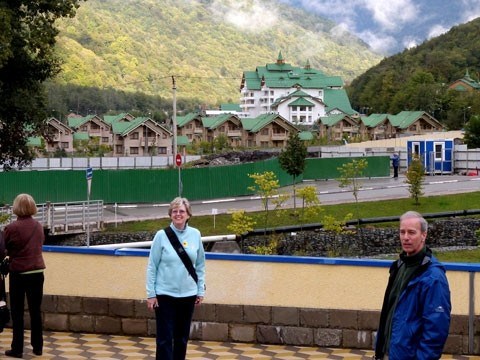Much like the scenario in Whistler and Vancouver four years ago, Sochi, Russia is preparing for the most extensive exposure it will ever receive.
The site of the 2014 Winter Olympics is still relatively unknown, even in Europe but Whistler resident and Russian historian David Malaher is familiar with both the region and its culture. He and his wife Rosemary travelled to Sochi in October 2010 to research and experience the area in its pre-Olympic state.
"To go up into the mountains and see what has been going on and knowing something of the antiquity of the area long before anyone thought of it as an Olympic Games site, it was interesting to start to fit that together with the coming out of Sochi," said Malaher, who will speak about his experience as part of the 2011 Speaker Series organized by the Whistler Museum.
"Sochi has been hidden and not mentioned as part of the world at all. It has been in Russian hands for 200 years, the last part of it was under the Soviet administration and they certainly didn't welcome visitors."
Similar to Vancouver's geography, the port city of 350,000 residents is fronted by the Black Sea and backed by the massive Caucus mountain range, but that's where the similarities end.
Due to its difficult location and long history of dictatorial Soviet rule, Sochi was known only within Russia as a national paradise while places like Odessa, the Danube River and the Bulgarian coast were more attractive to the international travelling public.
"We should credit the Soviet era with choosing Sochi as being the people's Riviera because the climate is very nice and Stalin, bless his ugly mind, did promote the idea that at least some of the workers should have an opportunity to go to a Russian spa or Russian holiday place and Sochi was the designated location," continued Malaher. "They took an otherwise indistinguishable little port and pumped it up and made it into a people's paradise and kept it hidden and now it's suddenly coming out and the 2014 Olympic Games will be the first of the major world class events to be starting there."
As Sochi lacked any pre-existing sporting infrastructure the Russian government is building all of its event sites from scratch. They are simultaneously working to draw other big name sporting events to make the city a year-round destination resort. Thus far they've secured a six-year contract to host an annual Formula One race and the Fédération Internationale de Football Association (FIFA) will use it as a host city. As of this year its ski hills will be used for Russian Olympic ski team selection competitions as well as the FIS Europa Cup - the European version of the NOR-AM competition.
"These are major, highly visible events that the Russians are going out of their way to invite and they've been successful in holding on to these three very major ones," continued Malaher, adding the infrastructure on the ski hill is transforming it from archaic to cutting edge.
"I have no real concerns about the physical sides of the Russian ski runs," he said. "What they've done now is leap over a couple of generations of ski lift designs and they've come right into the most modern things so it's all detachable quads and gondolas and wonderful stuff like that."
Malaher will speak about his experience in Sochi at the Whistler Museum on Wednesday, March 16 from 7 to 9 p.m. Tickets are $7. Contact education@whistlermuseum.org for more information.




